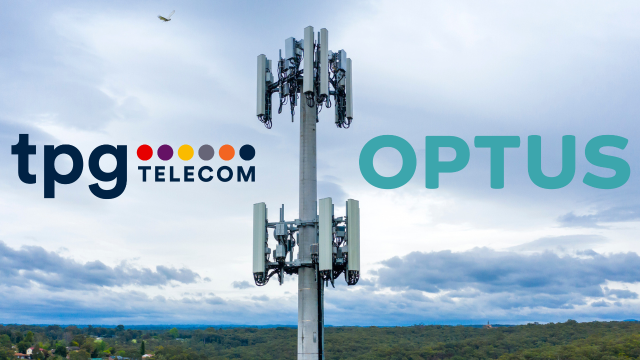Optus and TPG Telecom have announced that they’ve signed a network-sharing agreement, and that, subject to regulatory approval, the two phone network providers will merge their regional Australia signal sites, offering customers of either network equal network experiences outside of major cities. Oh, we are so back.
Optus will provide TPG Telecom with access to 2,444 networking sites across the country, bumping its coverage up to about 1,000,000 square kilometres (up from 400,000). This deal includes subsidiaries, including TPG’s Vodafone, iiNet, Lebara, and Felix, and is called the Multi-Operator Core Network (the MOCN).
Under the MOCN, TPG will give Optus some of its spectrum to bump up capacity, speed, and service quality. If the deal goes ahead in its current form, TPG Telecom customers will get access to the same 4G and 5G regional networks that Optus customers currently use.
The deal cost TPG Telecom $1.17 billion to license the infrastructure from Optus, according to the WSJ.
“The agreement will reduce combined 5G network rollout costs in regional Australia, which will enable the rollout of 5G infrastructure to be completed two years earlier than previously planned,” Optus interim CEO Michael Venter said.
“In a country as large as Australia, this is the sustainable approach we need to maximise established infrastructure and expand the reach of telecommunications services, competition and choice for consumers,” TPG Telecom CEO Iñaki Berroeta added.
Is this a re-run?
This might give you a sense of déjà vu because, in late 2022, the ACCC killed an extremely similar deal that Telstra and TPG were looking to make. It was a huge story in Australia’s tech space for the impact it could have on not just the experiences of users in regional and rural Australia, but also the competitive telco landscape.
Naturally, both of those things led to the deal being put on ice, with Telstra and TPG deciding that they wouldn’t appeal the Commission’s decision. The ACCC wasn’t convinced that the deal wouldn’t tip competition in Telstra’s favour, and it decided that public benefit didn’t outweigh the detriment that could come from lesser competition.
“The Spectrum Authorisation Agreement provides Telstra with substantial commercial and competitive benefits and would further increase Telstra’s position of market strength in mobile telecommunications markets,” the ACCC said at the time.
So the big ticket question is, how is this deal any different? The biggest difference is that Telstra has been cut out of the equation – which is notable, considering Telstra is the more popular network of the three, with the largest customer base and greatest network coverage. TPG’s CEO said that the agreement will “reset” the competitive landscape for regional mobile services.
Apart from that, at a consumer level, there is not much though more information should be revealed as we get further into the regulatory approval process.
“The structure of this active sharing arrangement with Optus has been informed by the findings and recommendations of the ACCC and Competition Tribunal respectively, following their previous review of the proposed 2022 Telstra deal. We believe this new proposed sharing arrangement is strongly pro-competitive and addresses previously expressed concerns,” a TPG Telecom spokesperson told Gizmodo Australia. We’ve also reached out to Optus for comment.
Telstra has also provided Gizmodo Australia with a statement. “Improving connectivity across regional Australia is important and we welcome Optus and TPG’s proposal to step up to this challenge,” a Telstra spokesperson wrote. “Telstra has invested significantly over many years to build the best mobile network in Australia. Customers in regional, rural and remote locations know that only Telstra can provide the secure, reliable, resilient mobile network they need. We’re committed to continuing to offer our customers, including across regional Australia, the country’s leading mobile network.”
“If this proposal goes ahead it is another reason for government, policy makers and regulators to look at how Australia uses the scarce resources of mobile spectrum to best support customers in regional, rural and remote areas. This should include ensuring that spectrum is allocated in a way that delivers the best outcomes for customers and reflects the investments different network operators have made to improve coverage.”
TPG and Optus argue that the deal will provide substantial improvements for Australian network competition and there are cost-efficiency arguments to be made as both companies roll out upgrades to their networks. The companies also believe the deal builds upon an existing passive equipment-sharing agreement between them in metropolitan areas, involving 3,500 sites, but this is a different arrangement.
The companies want to see this deal kick off by early 2025, with regulatory approval to follow. It will involve a non-exclusive agreement, an initial term of 11 years, and agreement extensions for further five-year periods.
We will update this story as it develops.
Image: iStock
